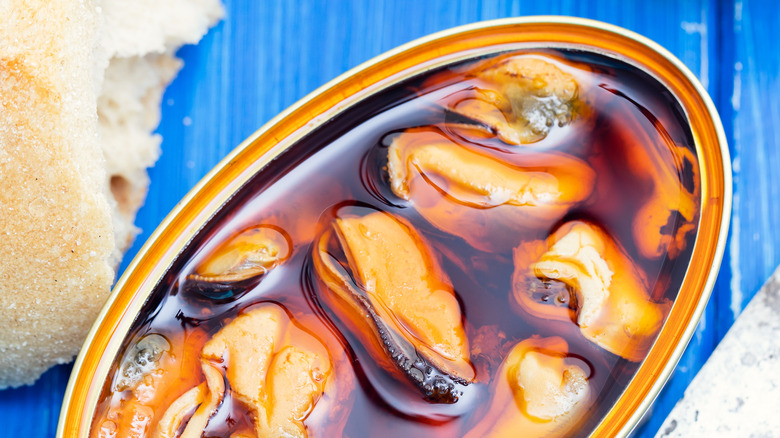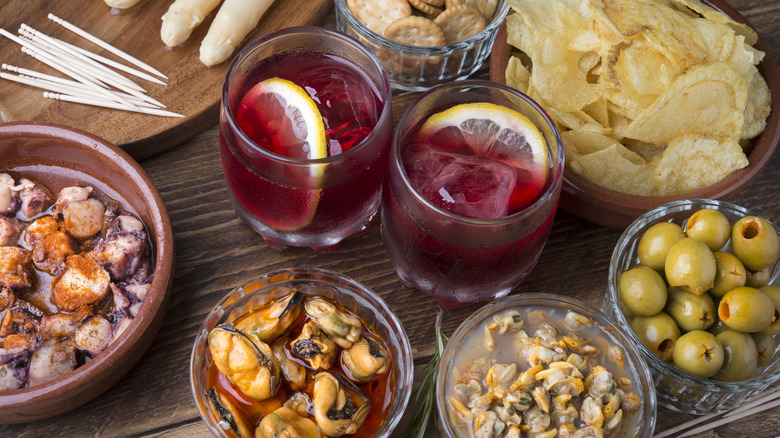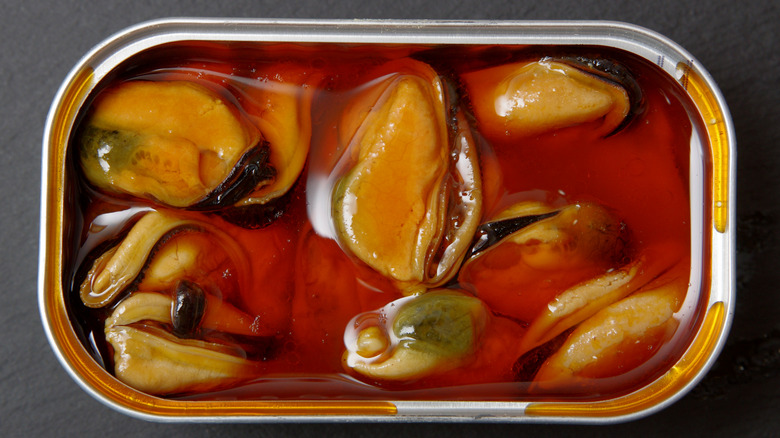This Spanish Marinating Technique Will Preserve Mussels With Full Flavor
Marinades can transform the flavor of any basic protein, but one Spanish marinating technique known as escabeche is a conservation method dating back several millennia that imparts wonderful flavor that enhances over time, per The Atlantic.
According to Bon Appétit, escabeche involves submerging a cooked protein or vegetable in a spiced oil and vinegar mixture. Though any meat, fish or vegetable can be preserved by soaking in an escabeche vinaigrette, mussels are a common item to prepare this way.
With a rise in popularity of tinned fish, high-quality store-bought versions of the dish are easily accessible, but at about $25 a pop, mussels escabeche are simple enough to make at home using the recipe adapted by NYC chef Alex Raij. Skip the pricey tinned version and opt to make your own at home for ultimate freshness, affordability, and flavor customization. The addictive pintxo goes quickly with salty chips around, but if you can resist, they are a perfect make-ahead menu item for any party or holiday spread.
Preservation using oil and vinegar
Vinegar is key to this preservation or pickling technique and using a high-quality vinegar is essential to a great escabeche. Serious Eats quotes Chef Sergi de Meià, president of the Catalan Cuisine Institute: "the sweetness in escabeche should come from the vinegar" and suggests using one made from very good wine.
Chef Zarela Martinez writes for the Los Angeles Times that "the ideal vinegar is one that has been allowed to mature without pasteurization or preservatives" Adding that "low-quality vinegars will give a hard edge to the dish instead of the mellow, subtle finish."
Similar to confit and conserva, the oil used in escabeche creates a protective seal that prevents spoilage. According to Olive Oil Source, oil is a natural preservative that keeps the protein from air exposure, delaying oxidation and molding.
Saveur notes that escabeche and many Spanish delicacies alike such as cheese held under oil, or salt-cured jamón ibérico and anchovies -– stand the test of time for their preservation abilities, referencing Anya Von Bremzen, author of "The New Spanish Table," stating that "these are dishes in which historically form has followed function, adding that "escabeche is a genius confit-pickle combo".
Packed with flavor
While the technique has largely remained the same, the flavor variations are innumerable. Saveur notes the ingredients typically consist of equal parts vinegar, wine, oil, and aromatics such as bay, and pimenton – the smoked paprika lends the dish's iconic bright red color. No matter what aromatics you choose, one thing for certain is that the mussels will continue to absorb all the flavors they sit with. Chef Sergi de Meià notes that "Mussels are like a sponge, it keeps its sea flavor and also absorbs everything else".
According to Saveur, the stronger in flavor the ingredient you are "escabeche-ing," the more potent the vinegar can be. Shellfish and white meats shine more in a subtle vinegar such as white wine or cider vinegar, while game meats and oily fish can hold up to stronger vinegars like red wine or sherry.
In the recipe by Alex Raij, Carrots are used for a touch of sweetness and lemon thyme adds a wonderful floral brightness. Equal parts rice wine and white wine vinegar are used with just a touch of sherry.


